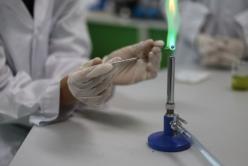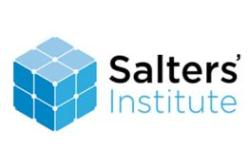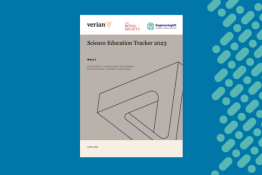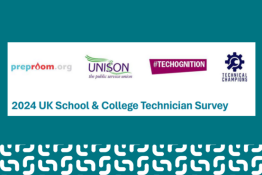Keeping Science Practical Programme

The programme, previously backed by the Wolfson Foundation, will continue to support schools in difficult circumstances in their provision of high-quality practical science education. Through a targeted and tailored programme of online and face-to-face CPD for science leaders, early career teachers and school science technicians, we will seek to increase the effectiveness of practical science in these schools.
We are also grateful for the generous support of the Salters’ Institute for supporting attendance of technicians at an ASE technician conference as part of the programme.
Recruiting for a new cohort of schools
We are now seeking expressions of interest from schools to take part in this fully funded programme of support for practical science. See below for full details of the programme aims and details of what is offered for schools who successfully apply to take part.
To be eligible to join the programme you will need to be:
- A secondary school in the UK
- A school with demonstratable disadvantages for learners, eg local socio-economic factors (like high levels of unemployment, and poor social mobility).
- If you aren’t sure if you are eligible, complete the expression of interest form below and we can discuss this with you.

Science Education Tracker 2023, The Royal Society, https://royalsociety.org/news-resources/projects/science-education-tracker/
“As a subject leader with a team of very limited experience, I was able to provide this CPD to them to help deliver areas of pedagogy that were science specific which really help their performance.”

Introduction to the project
The Keeping Science Practical project is focused on giving support around the delivery of effective practical science education experiences to pupils of schools in difficult circumstances. Programme participant institutions will receive extended support covering advice, CPD opportunities and educational resources all geared to enhance their provision of practical science in the classroom...
This project aims to improve the engagement and progression of young people from disadvantaged backgrounds into further study and careers in STEM. We are supported by The Spectris Foundation who share our passion/ and belief in the importance of practical science in helping learners follow a STEM career.
Reports such as the Science Education Tracker show that practical science is on the wane and that students are learning about practical science through an increasing number of videos and a decreasing number of hands on experiences. The percentage of GCSE students doing hands-on practical work at least fornightly dropped from 44% in 2016 to 37% in 2019 and 26% in 2023 with a rise in 2025 but only to 34%.
This project aims to increase and improve the practical science experiences of young people in disadvantaged areas of the UK by providing extended, in-depth practical science support for schools and colleges, focused particularly on science leaders, inexperienced or early career teachers and technicians.

Why should you get involved?
The 2023 Ofsted ‘Finding the optimum: the science subject report’ recommended that all pupils have enough opportunities to take part in high-quality practical work that has a clear purpose in relation to the curriculum. At secondary school, this should include laboratory work, fieldwork and teacher demonstrations.
The Royal Society of Chemistry's 2025 Science teaching survey reported that the technician workforce is at risk, and that although a high percentage of technicians at all key stages feel confident in delivering support in the classroom, they also reported that:
• Access to role-specific professional development is a challenge, with 30% of technicians in the UK indicating that they did not receive any CPD in the last academic year.
• Since the 2023 survey, there has been a 159% increase in technicians citing high levels of stress and exhaustion as reasons for leaving their roles.
• There is a shortage of science technicians, which is making it a challenge to run practical work.
By choosing a particular focus on trainee/early career teachers, it is hoped that we will be able to increase the value of their roles and mitigate the chances of them leaving the profession.
The Gatsby Good Practical Science Report (2017) identified five reasons we do practical work and 10 benchmarks to help this happen. The ASE has produced resources to support schools in writing a departmental policy for purposeful practical science work.

How it works...
The project revolves around providing support - essentially an enhanced institutional ASE membership package - to selected schools that successfully meet the criteria below. These schools will be supported through a tailored programme of a combination of online and face to face CPD, plus access to ASE resources and events...
Who can join?
The project is open to interested secondary schools across the whole of the UK. To be eligible you must be able to demonstrate that your learners are disadvantaged, for example, this could be due to local socio-economic factors (like high levels of unemployment, and poor social mobility). If you aren’t sure if you are eligible, complete the expression of interest form below and we can discuss this with you.
What our project involves?
- You get free departmental membership of the ASE (value of £250)
- Access to free, targeted CPD to help you and your team plan for and deliver purposeful and engaging practical work. The workshops are open to all members of the science department who would find them of interest, but the payments for attending online workshops are capped per school
- Technicians are able to join our free member Technician networking sessions
- Access to ASE-provided digital resources and journals
- Subsidised entry to the ASE Annual conference or a regional conference (Wales/NI/Scotland) with funding to support attendance
- Subsidised entry to an ASE technician conference with funding to support attendance (thanks to generous support from the Salters' Institute)
- Online professional development for science leaders/inexperienced teachers early career stage teachers/technicians with funding to support attendance
What we ask from you
- Science leaders to be able to attend two remote CPD workshops over the year
- (Early career stage) teachers are able to attend up to six CPD workshops over the year. These will feature topics such as behaviour management in practical work, practical work for all and effective demonstrations.
- One technician can attend the technician conference nearest to them
- A member of staff to act as the project lead and pass on information (teachers and technicians are welcome to receive the project email directly)

Feedback from previous participants
What teachers from our most recent cohort said about the workshops (which 98% of attendees rated as good or better)
“Accessing the recordings was useful as we could watch back as a department and then go over different sections again. Also allowed us to look at them more than once.”
“Good range of relevant topics, sensible scheduling, "catchup" recordings provided. Often, colleagues attended as a "team" in the same room to promote collaborative discussion.”
“The teachers have enjoyed watching the videos and it did directly link with the faculty development plan so they could see the importance and relevance to them.”
What teachers from our most recent cohort said about the project in general
“Rather than doing practicals that are for practical sake i.e. its in the scheme to do X practical at this stage. Teachers have a much better understanding of why they are doing the practicals, what the outcomes are for specific activities i.e. is it following methods, analysing data etc.”
“As a subject leader with a team of very limited experience, I was able to provide this CPD to them to help deliver areas of pedagogy that were science specific which really help their performance.”
“My ECTs have really engaged with the programme. We currently have 1 ECT2 and 2 ECT1. Even though all three trained after Covid, their training suffered in terms of practicals due to the impact of Covid. One of my ECTs had only carried out four practical activities during the entirety of his training year - this clearly has an issue on his level of knowledge and confidence in conducting both demonstrations and class practicals. I think that all the sessions have helped provide ideas for all the teachers on alternative practicals that they can do.”
“Thinking more widely about the reasons for carrying out practical work has helped to focus what we do during practical lessons - rather than trying to cover everything, focus on different skill elements every time you do a practical/experiment and plan for skill coverage over the course of the curriculum rather than trying to cram everything into each practical/experiment. Also having the sessions after school helped as they could be attended.”
Feedback specific to the technician strand
“Involvement in this project has allowed me to experience online learning, which has been very useful and convenient, especially since I did not have to delegate travel time to move locations and could gain knowledge right there at my workplace.”
“Taught me a great deal, and glad to be able to speak to others as I'm a lone technician.”
“Our technician liked the online sessions for collaborating with other technicians from different schools and gaining different insights and access to a community to share ideas. The physics demo was really useful and has been incorporated already into lessons.”




